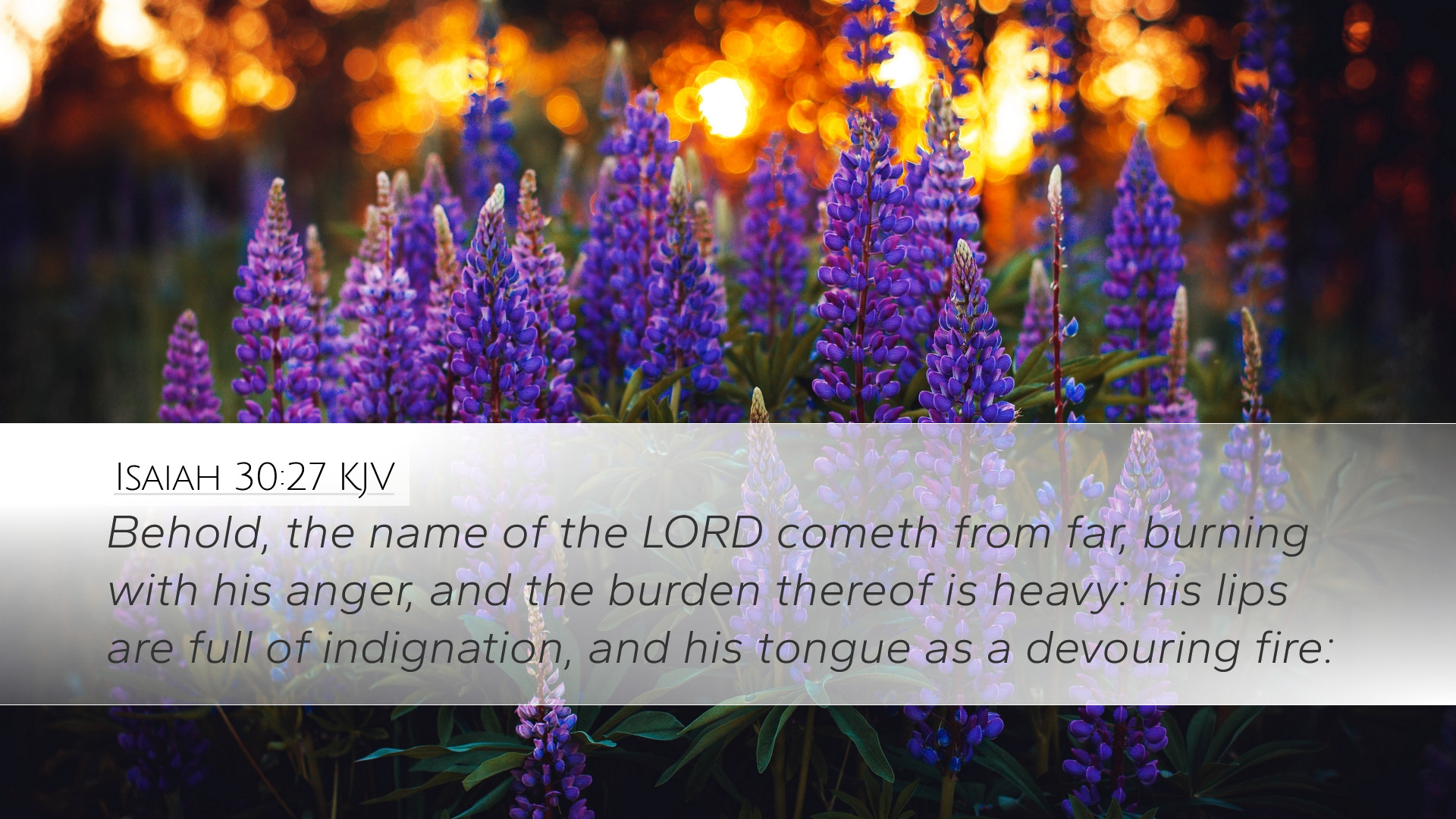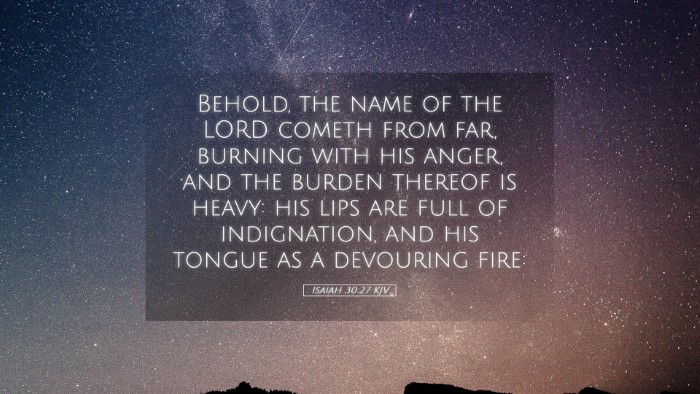Commentary on Isaiah 30:27
Verse Reference: Isaiah 30:27 - "Behold, the name of the LORD cometh from far, burning with his anger, and the burden thereof is heavy: his lips are full of indignation, and his tongue as a devouring fire."
Introduction
Isaiah 30:27 is a profound verse that captures the intensity of God's character and His judgment. This commentary will draw insights from several public domain scholars including Matthew Henry, Albert Barnes, and Adam Clarke. The verse serves as a vivid depiction of God’s wrath and judgment against sin, and it also speaks to His sovereignty and the ultimate fulfillment of His plans.
Exegesis and Analysis
The Nature of God's Approach
As mentioned in the verse, "the name of the LORD cometh from far," this phrase indicates that God’s presence, though distant, is imminent. Matthew Henry emphasizes that the coming of the Lord should invoke reverence rather than fear among His people. The aspect of divine anger, "burning with his anger," highlights God's holiness and intolerance of sin. This brings to mind the unchangeable nature of God, who remains faithful to His covenant and just in His responses to human disobedience.
The Heaviness of God's Burden
The term "the burden thereof is heavy" illustrates the seriousness of God's message and the consequences that arise from sin. Albert Barnes describes this burden as the gravity of divine judgment that awaits an unrepentant people. It is not merely a signal of anger but an indication of the weight of divine truth that Israel needed to acknowledge and respond to sincerely. The emphasis on the burden serves as a call to recognition of the severity of sin and its repercussions.
The Indignation of God
"His lips are full of indignation," conveys the deep, heartfelt response of God to the sinfulness of humanity. Adam Clarke elaborates on this by stating that God’s indignation is not arbitrary; it is a righteous response to the injustices and idolatry that characterized the people of Israel. This notion of divine indignation emphasizes both God's holiness and His love, as true love must respond to wrongdoing and injustice.
The Devouring Fire
The imagery of "his tongue as a devouring fire" further illustrates the potency of God's word and judgment. Matthew Henry notes that fire in scripture often symbolizes purification and judgment. In this context, the "devouring fire" serves as a metaphor for consuming judgment that removes dross and purifies the remnant. It points not only to destruction but also to the potential for renewal and restoration through God’s refining process.
Theological Implications
The implications of Isaiah 30:27 are far-reaching for both individual believers and the corporate church. It serves as a reminder of God's sovereignty over nations and humanity. His judgments often appear distant or delayed, yet this passage warns us that God’s plan is always in motion, and that He acts according to His timing and purpose. The proclamation of divine anger also encourages believers to reflect personally on their walk with God, urging them towards repentance and a renewed commitment to holiness.
The Call to Righteousness
The overarching theme that arises from this verse and the surrounding passages is the call to righteousness. Albert Barnes points out that the acknowledgment of God’s majesty motivates a response of humility and submission amongst His people. The heaviness of the burden calls for it's recognition and leads to a necessary call for spiritual awakening and restoration in the context of God's community.
The Promise of Hope
Although the tone of Isaiah 30:27 is one of warning, it is important to consider the larger narrative of hope that permeates Isaiah's writings. Adam Clarke suggests that while God’s judgment is fierce, His ultimate desire is for redemption and restoration. Thus, in this passage, we see an invitation to genuinely seek Him and to understand that while His judgments may be serious, His grace is extended to those who turn towards Him in repentance.
Conclusion
Isaiah 30:27 stands as a stark reminder of the dynamic nature of God's character—blending justice with mercy, anger with love. This commentary reveals the complexities of God’s relationship with His people, and challenges modern readers to not only fear His judgments but to embrace His call for righteousness. The insights from Henry, Barnes, and Clarke enhance our understanding of this verse, encouraging a deep and meaningful engagement with the text, motivating pastors, students, theologians, and scholars to live in accordance with God’s holy standards.


